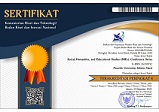Analisis Kemampuan Berpikir Kreatif Mahasiswa PGSD pada Pembelajaran IPA: Systematic Literature Review
Abstract
Creative thinking skills are an essential competency of the 21st century that prospective teachers need to have to face dynamic and complex learning challenges. This study aims to analyze the creative thinking skills of students of the Elementary School Teacher Education Study Program (PGSD) in the context of Natural Sciences (IPA) learning through the Systematic Literature Review (SLR) approach. Data was collected using the Publish or Perish app from publications from 2015 to 2025, resulting in 402 initial articles. Through a gradual selection process based on the relevance of the topic, the initial 144 articles were obtained, then the next selection was carried out based on the suitability of the respondents and the field of study, 9 main articles were obtained that were analyzed in depth. The results of the study show that the creative thinking ability of PGSD students in science learning is still relatively low. Some of the factors that cause this include conventional learning approaches, lack of use of innovative learning media, and low stimulation of divergent thinking skills. This study recommends the need for learning designs that encourage the exploration of ideas, creative problem-solving, and the use of innovative media to optimally develop students' creative thinking potential.
Kemampuan berpikir kreatif merupakan kompetensi esensial abad ke-21 yang perlu dimiliki calon guru untuk menghadapi tantangan pembelajaran yang dinamis dan kompleks. Penelitian ini bertujuan untuk menganalisis kemampuan berpikir kreatif mahasiswa Program Studi Pendidikan Guru Sekolah Dasar (PGSD) dalam konteks pembelajaran Ilmu Pengetahuan Alam (IPA) melalui pendekatan Systematic Literature Review (SLR). Data dikumpulkan menggunakan aplikasi Publish or Perish dari publikasi tahun 2015 hingga 2025, menghasilkan 402 artikel awal. Melalui proses seleksi bertahap berdasarkan relevansi topik diperoleh 144 artikel awal, kemudian seleksi selanjutnya dilakukan berdasarkan kesesuaian kesesuaian responden dan bidang kajian diperoleh 9 artikel utama yang dianalisis secara mendalam. Hasil kajian menunjukkan bahwa kemampuan berpikir kreatif siswa PGSD dalam pembelajaran IPA masih tergolong rendah. Beberapa faktor penyebabnya antara lain pendekatan pembelajaran yang masih konvensional, minimnya penggunaan media pembelajaran yang inovatif, serta rendahnya stimulasi terhadap keterampilan berpikir divergen. Kajian ini merekomendasikan perlunya desain pembelajaran yang mendorong eksplorasi ide, pemecahan masalah kreatif, dan penggunaan media inovatif untuk mengembangkan potensi berpikir kreatif siswa secara optimal.
Keywords
Full Text:
PDFReferences
Agustiana, I. G. A. T., Agustini, R., Ibrahim, M., & Tika, , I Nyoman. (2020). Perangkat Pembelajaran (RPS dan SAP) IPA Model (OPPEMEI) untuk Meningkatkan Keterampilan Berpikir Kreatif Mahasiswa PGSD. Jurnal Ilmiah Sekolah Dasar, 4(2), 309. https://doi.org/10.23887/jisd.v4i2.25190
Almeida, L. S., Prieto, L. P., Ferrando, M., Oliveira, E., & Ferrándiz, C. (2008). Torrance Test of Creative Thinking: The question of its construct validity. Thinking Skills and Creativity, 3(1), 53–58. https://doi.org/https://doi.org/10.1016/j.tsc.2008.03.003
Chopra, J., & Muddgal, A. (2019). Science education as driving transformations to sustainable and safe future. Journal of Advanced Research in Dynamical and Control Systems, 11(4 Special Issue), 2157–2161. https://www.scopus.com/inward/record.uri?eid=2-s2.0-85071966744&partnerID=40&md5=9a62ad6af1ac6afd6010976c0c98cae5
Hairunisa, Arif Rahman Hakim, & Nurjumiati. (2019). Studi Pengaruh Model Pembelajaran Berbasis Proyek (Project Based Learning) Terhadap Kreativitas Mahasiswa Program Studi PGSD Pada Mata Kuliah Konsep Dasar IPA. Jurnal Pendidikan Mipa, 9(2), 93–96. https://doi.org/10.37630/jpm.v9i2.190
Julianto, J., Wasis, W., & Agustini, R. (2022). Effectiveness of the Creative Attitude Model in Science Learning (CASL) to Train Creative Thinking Skills for Elementary School Teacher Education Students. IJORER : International Journal of Recent Educational Research, 3(5), 526–533. https://doi.org/10.46245/ijorer.v3i5.237
Juniarso, T. (2020). Model Discovery Learning Terhadap Kemampuan Berpikir Kreatif Mahasiswa. ELSE (Elementary School Education Journal) : Jurnal Pendidikan Dan Pembelajaran Sekolah Dasar, 4(1), 36. https://doi.org/10.30651/else.v4i1.4197
Kartikasari, I. A., & Usodo, B. (2022). The Effectiveness Open-Ended learning and Creative Problem Solving Models to Teach Creative Thinking Skills. Pegem Egitim ve Ogretim Dergisi, 12(4), 29–38. https://doi.org/10.47750/pegegog.12.04.04
Megawati. (2018). Pentingnya Pengakomodasian Pengalaman Belajar pada Pembelajaran IPA. Jurnal Tunas Pendidikan, 1(1), 21–30.
Ramdani, A., & Artayasa, I. P. (2020). Keterampilan Berpikir Kreatif Mahasiswa dalam Pembelajaran IPA Menggunakan Model Inkuiri Terbuka. Jurnal Pendidikan Sains Indonesia, 8(1), 1–9. https://doi.org/10.24815/jpsi.v8i1.15394
Selegi, S. F. (2019). Analisis Kemampuan Berpikir Kreatif Mahasiswa PGSD Dalam Mendesain Soal Tes Bentuk Uraian Untuk Meningkatkan Soft Skills Mahasiswa. JIKAP PGSD: Jurnal Ilmiah Ilmu Kependidikan, 3(3), 217. https://doi.org/10.26858/jkp.v3i3.10220
Sulistyaningrum, H., Winata, A., & Cacik, S. (2019). Analisis Kemampuan Awal 21st Century Skills Mahasiswa Calon Guru SD. Jurnal Pendidikan Dasar Nusantara, 5(1), 142. https://doi.org/10.29407/jpdn.v5i1.13068
Suryandari, K. C. (2021). The effect of scientific reading based project model in empowering creative thinking skills of preservice teacher in elementary school. European Journal of Educational Research, 10(3), 1329–1340. https://doi.org/10.12973/EU-JER.10.3.1329
Treffinger, D. J., Young, G. C., Selby, E. C., & Shepardson, C. (2002). Assessing Creativity: A Guide for Educators. In Journal of Education and Learning (Issue December). http://www.eric.ed.gov/ERICWebPortal/detail?accno=ED505548%0Ahttp://dx.doi.org/10.1007/s41465-016-0002-3
Tri Agustiana, I. G. A., Agustini, R., Ibrahim, M., & Tika, I. N. (2020). Efektivitas Model OPPEMEI untuk Meningkatkan Kemampuan Berpikir Kreatif Mahasiswa. Journal of Education Technology, 4(2), 150. https://doi.org/10.23887/jet.v4i2.25343
Wulan Febriani, A., Soetjipto, B. E., & Churiyah, M. (2023). Systematic Literature Review Dan Analisis Bibliometrik Pengaruh Work From Home (WFH) Terhadap Produktivitas Kerja Karyawan. Ganaya : Jurnal Ilmu Sosial Dan Humaniora, 6(3), 539–556. https://doi.org/10.37329/ganaya.v6i3.2402
Zuhri, R. S., & Wilujeng, I. (2023). Multiple Representation Approach in Elementary School Science Learning: A Systematic Literature Review. International Journal of Learning, Teaching and Educational Research, 22(3), 51–73. https://doi.org/10.26803/ijlter.22.3.4
Refbacks
- There are currently no refbacks.





